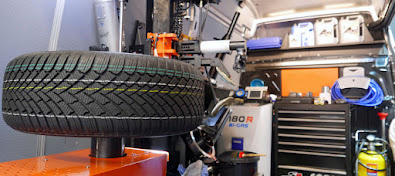Hydroplaning is frequently referred to as the skidding or sliding of a car's tyres on a wet surface. Hydroplaning happens when a tyre comes into contact with more water than it can disperse. A small layer of water separates the tyre from the road surface and causes it to lose traction due to water pressure at the front of the Car Tyres Nottingham pushing water under it. Loss of power control, braking, and steering is the outcome.
The tread (grooves) of rubber tyres are made to direct water away from the tyre and into the grooves. This increases the amount of friction between the tyre and the road, which can assist in avoiding or reducing hydroplaning.
Have you ever experienced a brief, or perhaps longer, skid when driving on a wet road? Most likely, you hydroplaned even if you didn't lose whole control.
Ways to Prevent Hydroplaning:
1. Proceed with Caution
When driving in the rain, stay extremely vigilant. When rain and oil from the road combine, a hazardous and slick material is created. If there is enough rain, eventually the water will wash the road clear, making the situation less dangerous. But slow down and watch out for other cars that may be skidding for the first ten to fifteen minutes. Moreover, give the automobile in front of you more room.
2. Decrease Speed
Driving too fast or accelerating too rapidly might cause hydroplaning. The majority of experts on driving safety advise against exceeding 35 mph since it might cause your car to hydroplane. To prevent all the additional risks that bad weather might offer, you should slow down if you're driving in the rain.
3. Steer clear of standing water
Although it might seem obvious, there are situations in which it is difficult to accomplish this, such as when a puddle is encountered when traveling quickly or when the entire road is submerged. All it takes for your car to hydroplane is shallow water.
4. Steer clear of ruts
Water or ruts should be driven carefully around as they are often found on the edge of the road. You might slide.
5. Track tyre wear.
Hydroplaning is more likely when tyres that are worn out and have insufficient tread or tread depth transport water less effectively. Tyres must disperse water, which builds up to a rather thick layer on the road, to the front, rear, and especially the sides to stay in contact with the pavement. If the water is immobile, waves will develop in front of the tyres. Similar to freezing rain, the tyres have a tendency to lift off the pavement and ride the waves.
6. Were you aware? Always check that the pressure in your tyres is the same as what the manufacturer recommends. It's crucial for maintaining the best possible water flow via the tyre grooves. The fact that broad tyres hydroplane more quickly than narrow ones should also be noted.
7. Steer clear of puddles
If you must cross a puddle, use the brakes before to doing so. Cars frequently go over big potholes that are concealed in puddles. You run the risk of damaging your wheels in addition to sliding.
Ways to Recover From Hydroplaning
Even the most experienced and cautious drivers can hydroplane despite taking all the necessary measures. Thus, understanding how to exit a skid is crucial.
1. Steer clear of brakes
Avoid using your brakes in the regular way as this might cause your automobile to go completely out of control. If you were using brakes when the hydroplaning occurred, gradually remove the brake until you regain control of the car. If you skid with your foot on the accelerator, gradually take your foot off of it. The secret is to avoid moving too rapidly or forcefully.
2. Sense The Tyre Reconnection
You will sense the tyres making contact with the road again after you are out of the skid and back on course. Relocate at the appropriate pace and exhale with relief. If the sensation of hydroplaning really freaked you out, stop until you've had time to gather your thoughts.
Hydroplaning is an inevitable part of driving, regardless of whether you live in a place with year-round rains or only occasional seasonal precipitation. You can handle that hydroplane incident like a pro if you slow down when your Continental Tyres Nottingham comes across any standing water on the road and maintain your composure while using the aforementioned advice.
.png)





